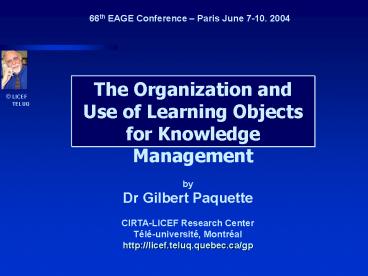Mod PowerPoint PPT Presentation
1 / 22
Title: Mod
1
66th EAGE Conference Paris June 7-10. 2004
The Organization and Use of Learning Objects for
Knowledge Management
by Dr Gilbert Paquette CIRTA-LICEF Research
Center Télé-université, Montréal http//licef.telu
q.quebec.ca/gp
2
Some Bookmarks
Books (5) AI and KB systems - Knowledge Modeling
- Instructional Engineering Research Knowledge
representation - Adaptive advisors - Virtual
learning centers - Instructional
Engineering Tools MOT, MISA, ADISA,
Explor_at_ Affiliations Télé-universités Research
Center (LICEF) - CIRTA Founder - Canada Research
Chair on CIE - President of Cogigraph Technology
DIR. Of the LORNET research network
Collaborations DMR, B. of M, Eduplus,
Hydro-Quebec, Canadian DoD, Armstrong Lab, ABL,
GDC, CAE, BGW, NOVASYS, Teleglobe,
Bell-Technomedia, CNET
3
Linked Concepts
- Knowledge Management
- Intellectual Capital
- Learning Organization
- Business Intelligence
- Organic Firm
- Process re-engineering
- Decision support
- Competency Management
4
A Growing Reality
- From 1997 to 1998, organizations involved in KM
has grown from 28 to 51! - Knowledge Management Special Report, May 1998,
Delphi Group, Boston - 1998, one third had KM initiative ongoing,
another third were preparing one - KPMG Study in 25 companies
- 2002 80 of 158 Fortune 1000 companies have a KM
programs - Conference Board and American Management
Association survey
5
Why Knowledge Management?
- Enterprises realize how important it is to know
what they know. - Knowledge is scattered in and outside the
organization, - In databases, documents, medias
- In peoples heads
- Knowledge takes time to acquire
- Early retirements and increasing mobility are
reducing the available knowledge owners - Knowledge grows exponentially and must be
assimilated at an ever faster rate - Life-long learning is an inescapable reality
6
Hidden and Tacit Knowledge
- Available information
- Explicited knowledge structured information
- Tacit knowledge not yet externalized
- (chunking phenomena)
- Hidden information
- Unmined information or databases
- Unidentified important information
7
Information and knowledge
Knowledge Engineering
Instructional Engineering
8
Knowledge Engineering
- A methodology to transform information into
usable knowledge - Goal Knowledge Elicitation, Representation and
Use - Phases
- Process planning
- Knowledge identification (using documents and
interview techniques) - Knowledge conceptualization (Modeling)
- Knowledge formalization (In XML, Data bases,)
- Structured information access (through a
computarized system)
9
Knowledge Modeling
10
MOT Modeling
11
Instructional Engineering
- Making knowledge available to people through
competency building - A systemic methodology
- Knowledge, skills, competency definition
- Instructional strategies and activities
- Media selection, adaptation, construction
- Delivery processes
12
MISA
13
Learning Objects and Interoperability
- A learning object is any entity, digital or
non-digital, that can be used, re-used, or
referenced during technology-supported learning.
(IEEE LTSC 2000) - Includes materials, tools, services, persons,
events - Not necessarily digitized, include printed, lab
material - Used not only by learners, but also other actors
- Includes activity descriptions, instructional
structure, learning or assistance scenarios.
14
Delivery models and Blended Learning
Communities of practice
Distributed Classroom
Online Coaching
Learning Portals
EPSS
15
Metadata Towards the Semantic Web
- Knowledge Objects (Resources) are described by
their Metadata properties and types of objects - Metadata is a basis for a Semantic Web
description of objects or resources - Need to be completed by an ontology concepts
relations axioms to provide intelligent search
and processing of content
16
Building LO Repositories
17
Referencing Learning Objects
18
Integrating and Using LOs
19
A Multi Actor Workflow Interface
20
Conclusion
- We have entered the knowledge economy knowledge
is the main asset. - Knowledge management is common sense, but it is
not yet common practice. - We need instrumentation
- for Knowledge Engineering To capture knowledge
assets - For Learning Object Repositories organizing
knowledge assets - For Instructional Engineering to plan ways to
use knowledge to increase competency - For Knowledge Delivery on the Web
21
The Benefits
- Knowledge gain for employee and organization
- Identify knowledge gaps and risks to company
development and jobs - Collective project, enabling more communication
between employees - Retain and value knowledgeable personnel
- Justified and well understood actions
- Better product linked to customers needs
22
66th EAGE Conference Paris June 7-10, 2004
Web- Based Learning is the Future of Education
and Training
Gilbert Paquette http//licef.teluq.quebec.ca/gp

